Created largely from observation and largely from landscape, Kreimer’s heavy use of simple mark-making and thick oil paint
shows inspiration from Auerbach. Both his observational and abstract work often use a muted palette range, with a beautiful use of light.
Kreimer’s artwork has been exhibited in multiple shows around the US, as well as over the pond in London.
In his own words
Could you please introduce yourself and tell us a bit about your background and how you chose to be an artist.
I was born in the US to parents who came from Argentina a few years earlier to pursue their doctorates. I was supposed to be a
doctor or a scientist and actually really liked studying biology and the mind, but in my first painting class as a freshman (first-year
student) in college, seeing my artist-professor’s Soho loft (this was the 90s!), I knew that I wanted to be an artist. I’d always drawn and painted and, as soon as I was old enough, I’d ride my bike to the museums, which are free, and just wander around and draw.
This year, I realized that, even though being an artist didn’t occur to me as something you could do until I was at college, I was sort of raised to be an artist and, this year, I had some eye-opening experiences. My parents had been active in the Buenos Aires art scene (centered around the now-legendary Instituto Di Tella) in the late 60s – in fact I was blown away a few months ago at MoMA, wandering through there with my Dad, who was visiting the States, to see the both of them in photos of a seminal media art performance in ’68, and it turns out that a project of theirs was included in a different, Latin-American architecture show at MoMA as well. They encouraged me to draw but were, nevertheless, surprised when they came to visit me, when I told them over dinner that I was going to be an artist.
What influences have driven your work and why?
As a kid, I was drawn to Pop art and, via Miami Vice, I got really into Memphis Milano. I used to make up crazy couches with multi-coloured backs that seemed to be exploding. But the biggest influences are Richard Diebenkorn and, through him, I understood, slowly, Henri Matisse, who sort of shows up in the studio sometimes to remind me to loosen up. Hilary Spurling’s biography of Matisse led me to look more at textiles. A few years ago, a textile designer friend lent me a suitcase full of lavish books on rugs and textiles and they’re an inspiration.
The other strand of my work has come pretty straight through from the Anglo-American observational painting tradition, folks like Rackstraw Downes, Fairfield Porter, and Frank Auerbach. I tend to like literate painters; somehow it comes through in the paint if the artist is a big reader.
What artworks do you find liberating, and whose creations have made you rethink how you approach and execute your own work?
There’s actually a lot of great Matisse paintings up in NY at any given moment, so when I’m feeling particularly stuck, I like to trek
up to the Met and look at the 1920s Nice paintings, with the rounded brushstrokes of just enough peach, red or turquoise. He
was the boss of his painting, taking it just to the point where it needed to be, or keeping painting and erasing, erasing and
painting until he reached some new freshness. There’s an informality to Picasso’s work that, every time I see one of his mid or late paintings, blows me away. He was so unpleasant that I don’t even want to like them, but he really did invent a language that we’re still using in painting. Another artist I turn to for liberation is Lois Dodd, who can depict a windowsill that’s as light as a breath and a meditation on mortality, all at once. She’s so direct it’s amazing.
How does a piece of work evolve for you? What stages do you go through to get to a finished image?
All the pieces, both observational and abstract, start with noticing things in the world, usually when I’m walking. For the landscapes, I come back to that spot, and work from back to front. I’ll draw in the general composition with terre verte, a weak pigment, then start banging in large shapes of light and dark. I do a lot of squinting, to ensure the picture makes sense in a larger sense.
The abstractions start with a sketch from memory of what I saw, then I’ll overlay that with drawings that express the emotions I felt then, feel now, memories that arise when thinking about the spot, and then erase and sort of start all over again. At a certain point, they depart from the thing I saw, and I have to just look at them sideways to get a sense of what they want.
What would you like to be doing with your art ten years from now?
I have no idea.
Julian Kreimer graduated with honors in 2003 with a M.F.A. from Rhode Island School of Design (RISD. He lives and works in Brooklyn.
He is an assistant professor of painting and theory at SUNY Purchase College in New York and is a frequent contributor to Hyperallergic, Art Critical, and Two Coats of Paint
All images courtesy of Julian Kreimer | www.juliankreimer.com
For more information on Hong Kong Art Tutoring please contact:
Gail Deayton
Telephone: +852 9722 8353
Email: info@hkarttutoring.com

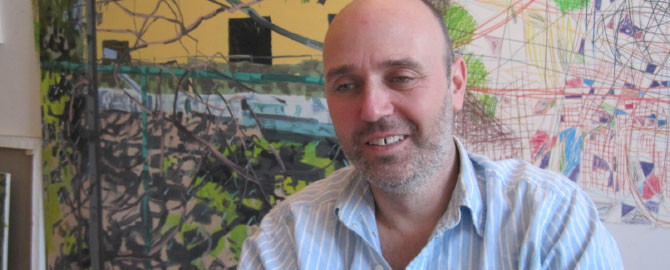
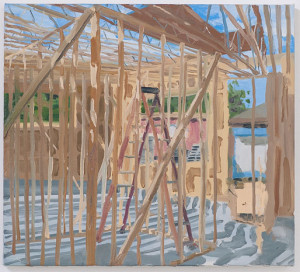
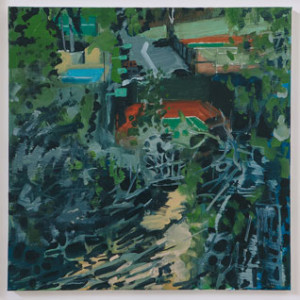
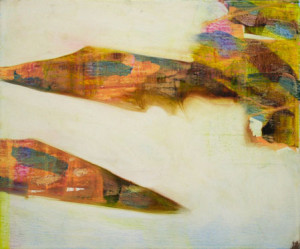
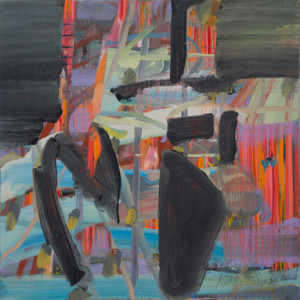
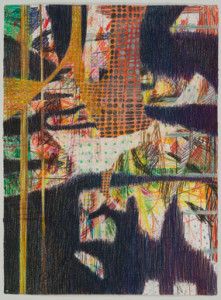
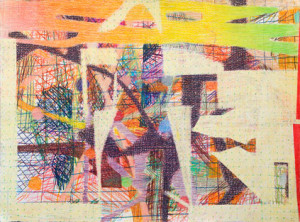





Wonderful paintings! Thanks for publishing this interview, I didn’t know about Julian Kreimer before.